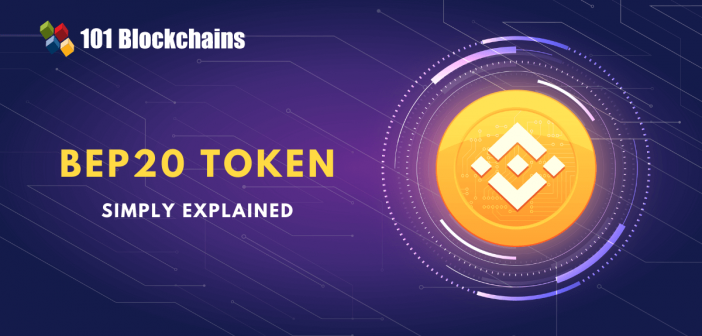Learn how blockchain truly works, master key definitions, and uncover what makes smart contracts so "smart." Dive into the fundamentals, gain valuable insights, and start your blockchain journey today!

- Guides
Georgia Weston
- on May 16, 2022
What is BEP20 Token – Simply Explained
The web3 landscape is thriving on the attention garnered by new technological innovations such as NFTs and DeFi. However, it has become more potent in recent times with the introduction of new blockchain networks such as the Binance Smart Chain or BSC. Binance Smart Chain introduced the unique BEP20 token standard, which has been gaining unparalleled recognition in the web3 developer community.
Interestingly, some developers have claimed that BEP20 is a better alternative in comparison to the ERC20 token standard on Ethereum. Therefore, many beginners in the web3 world want to figure out what is BEP20 is and how it supports the Binance Smart Chain. The following discussion offers you a detailed guide on BEP20 basics, the parameters of BEP20, and the different examples of its applications.
Build your identity as a certified blockchain expert with 101 Blockchains’ Blockchain & Web3 Certifications designed to provide enhanced career prospects.
Basics of BEP
The discussions on the BSC BEP20 standard for tokens rely heavily on a basic understanding of BEP and the BSC connection. BSC or Binance Smart Chain is the first thing you need to understand to set the ground for discussions about BEP20. Binance Smart Chain is the dedicated blockchain of Binance for operating smart contracts. The BSC works in parallel or in collaboration with the Binance Chain, the first blockchain of the Binance crypto exchange.
BEP20 basically refers to a token standard used for creating tokens on BSC, just like ERC20 for creating tokens on Ethereum. It is a critical tool for facilitating smart contract development on the Binance Smart Chain. We shall arrive at a detailed discussion on ‘what is BEP20’ later. For now, you must note that BEP stands for “Binance Smart Chain Evolution Proposal.”
Excited to learn the basic and advanced concepts of ethereum technology? Enroll Now in The Complete Ethereum Technology Course
Reasons for Introducing BSC
The Binance Smart Chain BEP20 interconnection sets some strong precedents for creating autonomous blockchain platforms to facilitate web3 development. Since BSC is the playground on which you can play with BEP20 tokens, it is important to learn about Binance Smart Chain. Binance introduced the Binance Chain with the sole objective of enabling faster transactions on the Binance exchange.
The most important highlight of Binance Chain focused on the resolution of design problems, which lead up to network congestion. However, the flexibility of the Binance Chain for allowing faster transactions creates limitations for launching DEX on Binance. Therefore, Binance Smart Chain evolved as a favorable answer for accommodating smart contracts alongside automated transactions. As a matter of fact, Binance Smart Chain or BSC set the foundations for the DEX project of Binance.
Want to learn blockchain technology in detail? Enroll Now in Certified Enterprise Blockchain Professional (CEBP) Course
Dual Chain Architecture
The dual chain architecture of Binance is one of the significant highlights you can consider while exploring details of a Binance Smart Chain BEP20 wallet address and related transactions. Binance uses the Binance Chain and Binance Smart Chain in parallel to each other with common native tokens, i.e., BNB.
Both the chains are independent of each other, and the dual chain architecture is more or less like a bridge. Binance uses the Binance Bridge, which features a unique set of mechanisms for seamless movement of assets and interoperability. Take note of the fact that BSC operates completely independent of the Binance Chain.
Since the Binance Smart Chain and Binance Chain are different blockchain networks, you have different token standards for them. The BEP20 token standard works as the native standard for Binance Smart Chain. Let us dive deeper into the definition of BEP20 and its uses.
Start learning Blockchain with World’s first Blockchain Career Paths with quality resources tailored by industry experts Now!
Definition of BEP20

The first thing you need to know before creating a BEP20 address would point at the definition of the BEP20 standard. It is a token standard for Binance Smart Chain and works like the ERC20 standard in many ways. The token standard specifies some clear rules for all BSC-based tokens. If you look closely, the BEP20 standard for Binance Smart Chain is applicable for any token created or launched on BSC. Some of the examples include security tokens, utility tokens, and stablecoins. In addition, BEP20 also offers support for creating “Peggy Coins,” a unique category of crypto tokens you can peg against various assets.
The similarity between BEP20 and ERC20 becomes clearly evident in the use of BNB as payment for transactions with BEP20 tokens on the BSC network. Seems similar to gas fees on Ethereum, doesn’t it? Anyone can create Binance Smart Chain BEP20 tokens with the help of simple tutorials. Therefore, BEP20 is an integral aspect of the growth of BSC as a vital tool for web3 development.
Want to learn the basic and advanced concepts of Stablecoin? Enroll in our Stablecoin Fundamentals Masterclass Course Now!
Parameters in BEP20 Token Standard
The definition of BEP20 can seem like the perfect foundation to discover answers for “What is BEP20 used for?” and other details. However, you need to understand the different parameters associated with the BEP20 standard, which define the distinct functionalities of BEP20 tokens. The notable BEP20 standard parameters include the following.
-
Blacklist
The “Blacklist” parameter helps in blacklisting or banning a dubious BEP20 address or other malicious addresses.
-
Can Mint
The “Can Mint” parameter serves as the inflationary parameter for the BEP20 standard. The parameter provides specifications regarding possibilities for minting new tokens to increase the BEP20 supply.
-
Can Burn
The “Can Burn” parameter is the ideal complement for the “Can Mint” parameter and serves as the deflationary parameter. The “Can Burn” parameter can specify the possibility of burning tokens to reduce supply.
-
Can Pause
The “Can Pause” parameter is an innovative and useful parameter for safeguards against malicious attacks. In event of any malicious attack or platform downtime, users can pause all the BEP20 token operations. However, the “Can Pause” parameter is centralized, and the creator or user address with similar authority can pause the operations of the BEP20-based network.
Start your blockchain journey Now with the Enterprise Blockchains Fundamentals – Free Course!
The BEP20 and ERC20 Connection
The outline of answers for “What is BEP20 used for?” would point to how BEP20 is almost the same as ERC20. Developed as an alternative to Ethereum, Binance Smart Chain needed a token standard at par with ERC20. Therefore, you can find many similarities between both token standards, thereby shedding light on their functionalities. Here are some of the notable similarities between the BSC BEP20 standard and the Ethereum ERC20 token standard.
- “totalSupply” parameter for finding out the total number of tokens in smart contracts.
- “balanceOf” parameter for accessing information regarding the number of tokens in a Binance Smart Chain BEP20 wallet address of a user.
- BEP20 also supports adding a human-readable name to the new token, like ERC20. In addition, you can also create a ticker symbol for the token and specify the divisibility for the token.
- ERC20 and BEP20 tokens also offer the flexibility of specifying conditions for token transfers between users.
- “transferFrom” function in the BEP20 token standard can work wonders for the automation of transfers through approved individuals or smart contracts.
- You can also leverage the “Allowance” function in the BEP20 standard for checking the unspent part of a transaction.
- The “Approve” function helps in restricting the number of tokens a smart contract can withdraw from your balance.
Apart from the notable similarities, you can find a few differences between the Binance Smart Chain BEP20 standard and the Ethereum ERC23 standard. For example, the ‘symbol,’ ‘name,’ and ‘decimal’ functions are mandatory in the case of BEP20. On the other hand, BEP20 also features a unique “getOwner” function to retrieve information about the owner of BEP20 tokens.
Get familiar with the terms related to ethereum with Ethereum Flashcards
Examples of BEP20-based Projects
The detailed overview of BEP20 fundamentals calls for attention to “What is BEP20 used for?” and the value of BSC. Binance Smart Chain is gradually expanding with transaction volume, total value locked, and user base. In addition, BSC is a top choice of dApp developers, and developers need wallets like the BEP20 Trust Wallet for creating BEP20 tokens. Prior to an overview of the methods for creating BEP20 tokens, let us go through some examples of popular projects based on the BSC BEP20 standard.
-
Autofarm

The first example of a popular project on Binance Smart Chain is Autofarm, a yield aggregator and DEX. You can use assets as collateral and liquidity on the platform, which vaults can carry out all the automated actions. The DeFi platform offers support for the BEP20 wallet, Metamask, and Binance Smart Chain.
-
PancakeSwap

The biggest example of successful Binance Smart Chain BEP20 projects is PancakeSwap, the popular AMM. It is presently one of the leading decentralized exchanges, developed on the foundations of the Binance Smart Chain.
The diverse functionalities of PancakeSwap help in exchanging tokens on the BSC. Most important of all, PancakeSwap has also launched its own NFT marketplace. Therefore, it is one of the top picks for any developer seeking opportunities to create a decentralized exchange on BSC.
-
BEP20 Money Market Protocols

If you want to know the true potential of the BEP20 token standard, then you must review the examples of money market protocols based on the standard. Venus offers a credible protocol for decentralized lending and borrowing on the foundations of BSC. As an algorithm-based money market system, Venus employs two distinct BEP20 tokens, with one serving as the stablecoin and the other as the governance token.
Want to learn and understand the scope and purpose of DeFi? Enroll Now in Introduction to Defi- Decentralized Finance Course
Top Examples of BEP20 Tokens
What can you do with a Binance Smart Chain BEP20 wallet address? Fill it with tokens, obviously! Now, it is important to know what types of BEP20 tokens you can find in the market and whether they have been successful or not. Some of the popular examples of BEP20 tokens include CAKE, BUX, BUSD, ALPHA, WBNB, and SAFEMOON. Developers look up to these projects and work on unique BEP20 tokens in the emerging web3 landscape.
With the right resources, such as the right web3 platform and guidance on BEP20, you can create your own BEP20 project on BSC. As Binance Smart Chain starts moving towards NFTs, it is important to wonder about the opportunities you can explore with BEP20.
Get familiar with the terms related to non-fungible token with Non-Fungible Token Flashcards
Final Words
The overview of Binance Smart Chain and BEP20 tokens showed detailed insights into how the new token standard can support web3 developers. Developed along the lines of ERC20, the BEP20 standard comes with some unique improvements in functions and new parameters. For example, BEP20 offers the flexibility for pausing network operations in event of network downtime or compromised access.
Most important of all, popular examples such as PancakeSwap showcase the right window of opportunity for creating dApps with the BEP20 standard. On top of it, the BEP20 standard also enables EVM compatibility, which resolves all problems regarding usability. In addition, the BEP20 standard has many promising advantages for the web3 ecosystem. Learn more about the BEP20 tokens and their significance in the broader web3 landscape.
*Disclaimer: The article should not be taken as, and is not intended to provide any investment advice. Claims made in this article do not constitute investment advice and should not be taken as such. 101 Blockchains shall not be responsible for any loss sustained by any person who relies on this article. Do your own research!





